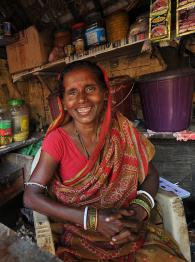
About the Project
This project is one of the 2012 WISE Awards finalists.
Since 1989, Freedom from Hunger has developed, tested and disseminated microfinance and non-financial products and services—in particular, behavior-change education—designed to meet the unique needs of poor, illiterate women. When these services are combined with savings and micro-loans, they enable the poor to address and control many of the multifaceted causes of poverty.
Freedom from Hunger is committed to promoting and disseminating this “value-added microfinance” approach and to sustainably improving the nutrition, health and livelihood of poor women. Through partnerships and collaboration, Freedom from Hunger provides training and technical assistance to local organizations that adopt or adapt its methodologies to reach large numbers of women and their families, enabling them to achieve food security.
The impacts of Freedom from Hunger’s program are well-documented. Its signature value-added microfinance program, Credit with Education, has shown conclusive contributions to family income, women’s empowerment, children’s nutritional status and improved health knowledge and skills. Delivering education paired with financial services through self-managed, mutually responsible groups of women, has shown to be a transformative approach, positively impacting the lives of women and their families.
Context and Issue
Freedom from Hunger’s education sessions prepare mothers to manage their scarce resources more effectively, earn more from their businesses and keep their families healthy and well-nourished. The education modules cover topics that include financial education, business management, household finances, health and nutrition, self-esteem and consumer education and protection.
Behavior-change education helps families avert crises and keeps them from sliding backwards into a cycle of deeper poverty. Because beneficiaries gain new knowledge and skills at the same time they have access to money, they are empowered to act on this new knowledge and are more likely to commit to behaviors that can lead to greater social, economic and health progress for themselves, their families and their communities.
Solution and Impact
The project’s innovative model is based on the idea that beneficiaries are central to the design phase of the project model. They participate in a needs assessment that identifies existing knowledge, current practices, beliefs and resources available in the community, which allows Freedom from Hunger to develop education sessions that are locally appropriate and meet their specific needs.
In terms of the overall impact of the project, Freedom from Hunger maintains an active research and impact evaluation agenda and has documented that women participating in Credit with Education have more income and savings, improved nutrition and health practices and enhanced self-confidence when compared to other women.
Future Developments
In the coming years, Freedom from Hunger seeks to enhance the resilience of vulnerable communities by helping them better plan for and manage shocks and stresses that threaten food security and livelihoods by 1) strengthening knowledge and skills through education and 2) encouraging the use of new knowledge and skills by enhancing the linkages to public and private health and agriculture services.
Freedom from Hunger will continue to focus its outreach through women’s solidarity groups and youth who are organized in savings groups. Its role will be to facilitate learning and promote the resourcefulness and responsiveness of beneficiaries to solve critical issues. It will do this by providing training and technical assistance to its local partners and promoting linkages with public and private sectors to provide access to critical social services.


